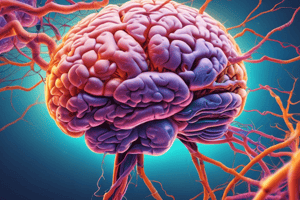Podcast
Questions and Answers
What is the function of Acetylcholine (ACh)?
What is the function of Acetylcholine (ACh)?
- Inhibitory; regulates mood
- Excitatory; stimulates muscle contraction (correct)
- Inhibitory; pleasurable sensations
- Excitatory; used in memory
What effect does a deficit of Dopamine have?
What effect does a deficit of Dopamine have?
Parkinson's disease
What is a possible effect of surplus Serotonin?
What is a possible effect of surplus Serotonin?
- Depression
- Anxiety
- Autism (correct)
- Schizophrenia
What role does Norepinephrine play in the body?
What role does Norepinephrine play in the body?
What are the effects of a deficit in GABA?
What are the effects of a deficit in GABA?
What is the function of Endorphins?
What is the function of Endorphins?
Glutamate is an inhibitory neurotransmitter.
Glutamate is an inhibitory neurotransmitter.
What effect does a surplus of Glutamate have?
What effect does a surplus of Glutamate have?
Flashcards are hidden until you start studying
Study Notes
Acetylcholine (Ach)
- Functions as an excitatory neurotransmitter, crucial for muscle contraction.
- Involved in cognitive processes like attention, memory, and learning.
- Deficiency linked to Alzheimer's disease, causing cognitive decline.
- Excess can lead to severe muscle spasms.
Dopamine (DA)
- Acts as an inhibitory neurotransmitter, associated with pleasure and reward sensations.
- Critical for voluntary movement, attention, and learning.
- Deficiency results in Parkinson's disease, characterized by motor control issues.
- Surplus associated with disorders such as schizophrenia and increased risk of drug addiction.
Serotonin
- Functions inhibitory, regulating mood, emotional states, and appetite.
- Plays a role in sleep and wakefulness cycles.
- Low levels are connected to depression and various mood disorders.
- High levels may relate to autism spectrum disorders.
Norepinephrine (NE)
- Serves as an excitatory neurotransmitter involved in the fight-or-flight response.
- Important for mood modulation, learning, and memory retrieval.
- Deficits linked to mental health issues, notably major depression.
- Excessive norepinephrine can lead to anxiety disorders.
GABA (Gamma-Aminobutyric Acid)
- Functions as an inhibitory neurotransmitter, balancing excitatory signals in the brain.
- Regulates daily sleep-wake cycles and reduces neuronal excitability.
- Low levels associated with conditions like anxiety, seizures, tremors, and insomnia.
- Surplus may contribute to sleep and eating disorders.
Endorphins
- Acts as an inhibitory neurotransmitter, key in pain perception and promoting positive emotions.
- Similar to opiate effects, providing relief from pain.
- Deficiency can result in increased pain experiences.
- Surplus may lead to a diminished perception of pain and potential for artificial highs.
Glutamate
- Functions as an excitatory neurotransmitter, essential for memory, learning, and motor functions.
- Enhances synaptic transmission efficiency.
- Excess levels can disrupt balance between excitatory and inhibitory actions, linking to epileptic seizures.
Studying That Suits You
Use AI to generate personalized quizzes and flashcards to suit your learning preferences.




